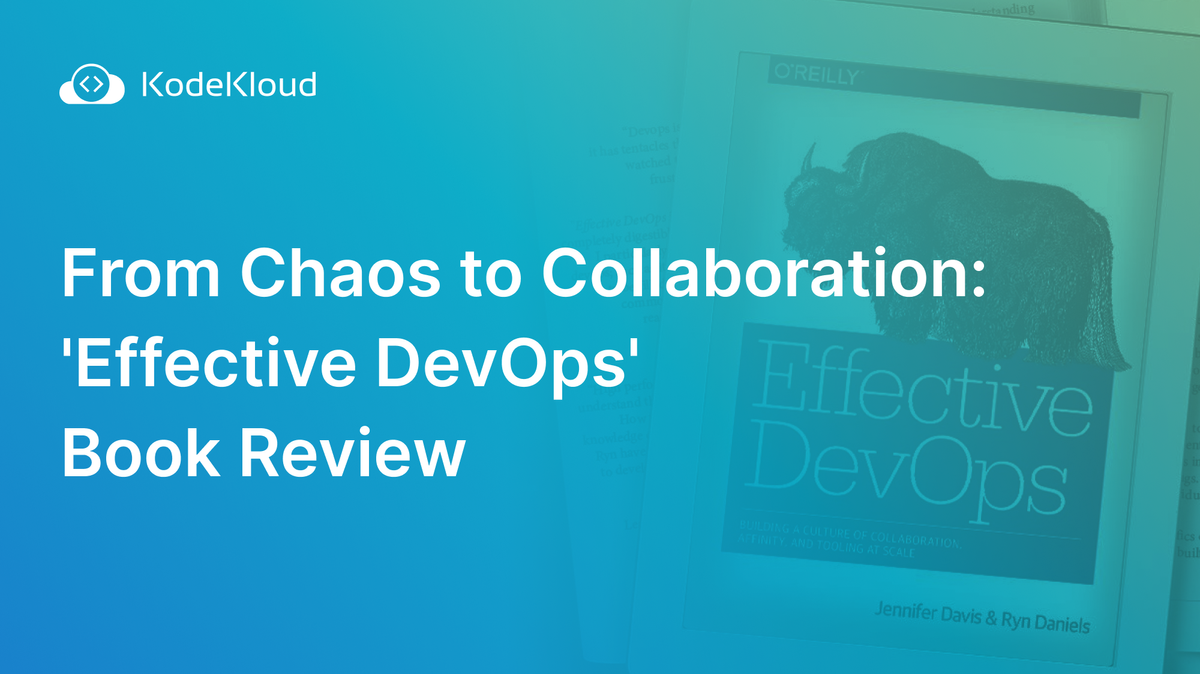The DevOps Handbook - A Comprehensive Book Review
"The DevOps Handbook" is rightly celebrated as a monumental guide that stands as a pillar of knowledge and inspiration for individuals and organizations navigating the transformative pathways of DevOps.
"The DevOps Handbook" - by Gene Kim, Jez Humble, Patrick Debois, and John Willis
Whether you’re a novice stepping into the DevOps world or a seasoned technologist, "The DevOps Handbook" is your reliable companion. It’s not just a book; it’s a comprehensive guide spread across meticulous chapters, each echoing the profound insights and practical wisdom of the DevOps realm.
Check out our other book review here:

In this review, we unfold the pages of this remarkable handbook, navigating through its enlightening content. This isn’t just another review; it’s a simplified guide, a bridge connecting you to the vast universe of DevOps knowledge encapsulated in this book.
As we traverse through the chapters, we’ll uncover the essence of the book, exploring its structure, content, and the invaluable lessons it offers. So, buckle up as we embark on this enlightening journey through "The DevOps Handbook," exploring the treasures hidden within its pages.
Before we dive right in! Check out our course on Fundamentals of DevOps:

Book Background: Crafting the DevOps Encyclopedia
No other book encapsulates the A to Z of DevOps wisdom better than The DevOps Handbook. It is the brainchild of four visionary friends: Gene Kim, Jez Humble, Patrick Debois, and John Willis.
Their journey wasn’t a stroll in the park; it was a marathon of relentless effort, spanning five years and 2000 hours of meticulous crafting. The goal? To create a beacon of guidance in the ever-evolving landscape of DevOps, a book that stands resilient amidst the tides of change, offering practical insights and real-life examples.
"The DevOps Handbook" is not just ink on paper; it’s a reservoir of ‘Aha! Moments,’ a collection of illuminating innovations and experiences that underscore the transformative power of DevOps. It’s an arsenal of tools and techniques that empowers you to navigate the DevOps journey with confidence and creativity.
In the hands of its readers, this book is more than a passive repository of information; it’s an active catalyst of inspiration and innovation, encouraging you to carve your own path and create your own ‘Aha! Moments’ in the realm of DevOps.
Organization of the Book: A Compass in the DevOps Odyssey
Navigating through the vast seas of DevOps can be a daunting task. But fear not, for "The DevOps Handbook" acts as a steadfast compass, guiding you through turbulent waters with structured precision. The book doesn’t demand a linear journey; instead, it graciously offers itself as a constant companion, ready to provide insights whenever you seek them.
The authors have meticulously organized the content into six coherent parts, each a treasure trove of knowledge. The initial part serves as a gateway, introducing the rich history, core theories, and evolutionary milestones of DevOps. It’s a foundation preparing you for the deeper dives ahead.
As you traverse the book, you encounter the concept of value streams, enriched with case studies and practical anecdotes. The journey continues, exploring the Three Ways of DevOps, each dissected with clarity and depth in separate sections of the book.
The final part of the book unveils the integration of security into DevOps, heralding the era of DevSecOps. It’s a testament to the book’s foresight, embedding the essence of security into the DevOps practices way ahead of its widespread acknowledgment.
"The DevOps Handbook" is not just a guide; it’s a mentor, enabling you to explore, learn, and apply the multifaceted practices of DevOps with confidence and clarity. Its organization ensures that whether you are a novice setting sail or a seasoned navigator, the journey is enriching, enlightening, and empowering.

The Three Ways: Navigating the Core Principles of DevOps
Embarking further into the journey, "The DevOps Handbook" unveils the core principles known as The Three Ways. These principles aren’t just theoretical landmarks; they are practical pathways that guide the implementation of DevOps practices with precision and clarity.
The First Way emphasizes the smooth and swift flow of work, ensuring that ideas don’t just circulate but navigate efficiently from development to operations, finally reaching the customer with value and impact. It’s about optimizing the workflow, ensuring that the journey from conception to delivery is streamlined and effective.
The Second Way underscores the essence of feedback. It’s the wind that helps correct the sail, ensuring that errors are caught, analyzed, and rectified promptly. This principle fosters a culture where feedback loops are tight, and continuous improvement is ingrained in the workflow.
The Third Way is the embodiment of a culture that thrives on learning and experimentation. It encourages a mindset of continuous evolution, where risks are embraced, and learning is celebrated. It’s about fostering an environment where innovation flourishes and new horizons are continuously explored.
In this part of the book, the authors also intertwine the essence of lean principles, showcasing their transformative impact on the technology value stream. It’s a blend of traditional wisdom and contemporary practices, ensuring that the journey of DevOps is not just efficient but also continuously evolving and improving.
The book navigates through these principles with a balance of depth and practicality, ensuring that the journey through the Three Ways is not just informative but also immensely applicable. It’s a voyage through the heart of DevOps, exploring its essence with clarity, insight, and practical wisdom.
Enabling Every Team Member to be a Generalist
Diving deeper into the realms of organizational efficiency and productivity, "The DevOps Handbook" presents a compelling argument for nurturing generalists within a team.
- The Power of Generalists:
Emphasizing the multifaceted potential of generalists, the book underscores their ability to navigate various roles and responsibilities with adaptability and finesse, reducing the dependency on specialized roles.
- Reducing Handoffs and Delays:
By fostering a team of generalists, the frequency of task handoffs is minimized, streamlining workflows and reducing lead times. It’s about optimizing the process to enhance productivity and efficiency.
- Promoting Continuous Learning:
Encouraging team members to embrace a wide spectrum of skills and knowledge areas, the book advocates for a culture of continuous learning and development, enabling individuals to navigate various facets of a project with competence.
- Strategic Rotation and Cross-Training:
The strategy of rotating team members through different roles is highlighted as a means to foster a broader understanding of the project lifecycle and to cultivate a versatile skill set among team members.
Keeping Team Sizes Small: A Strategy for Enhanced Productivity and Communication
In a world where bigger often masquerades as better, "The DevOps Handbook" brings to the forefront the undeniable merits of small, agile teams in the DevOps landscape.
- The Two-Pizza Rule:
Echoing Amazon’s innovative rule, the book emphasizes that a team should be small enough to be fed by two pizzas, fostering a close-knit environment conducive to effective communication and collaboration.
- Enhancing Communication:
Small teams naturally facilitate clearer and more efficient communication channels, ensuring that every member is aligned with the team’s objectives and current projects.
- Empowering Team Members:
In a compact team, each member holds significant responsibility, fostering a sense of ownership, accountability, and a personal investment in the success of the projects.
- Facilitating Leadership Experience:
Smaller teams allow members to take on leadership roles, nurturing their management skills and contributing to their professional development.
- Optimizing Product Evolution:
With fewer members, the team can more effectively control and optimize the rate at which a product or service evolves, ensuring that it remains aligned with customer needs and market demands.
Want to understand the DevOps world's key concepts? Enroll in our Fundamentals of DevOps course.
Conclusion: The DevOps Handbook - A Beacon of DevOps Wisdom
In conclusion, the book is heralded as an indispensable reservoir of practical insights and strategies that resonate with DevOps novices and veterans.
"The DevOps Handbook" is rightly celebrated as a monumental guide that stands as a pillar of knowledge and inspiration for individuals and organizations navigating the transformative pathways of DevOps.
Watch The DevOps Handbook book review on our YouTube channel:


